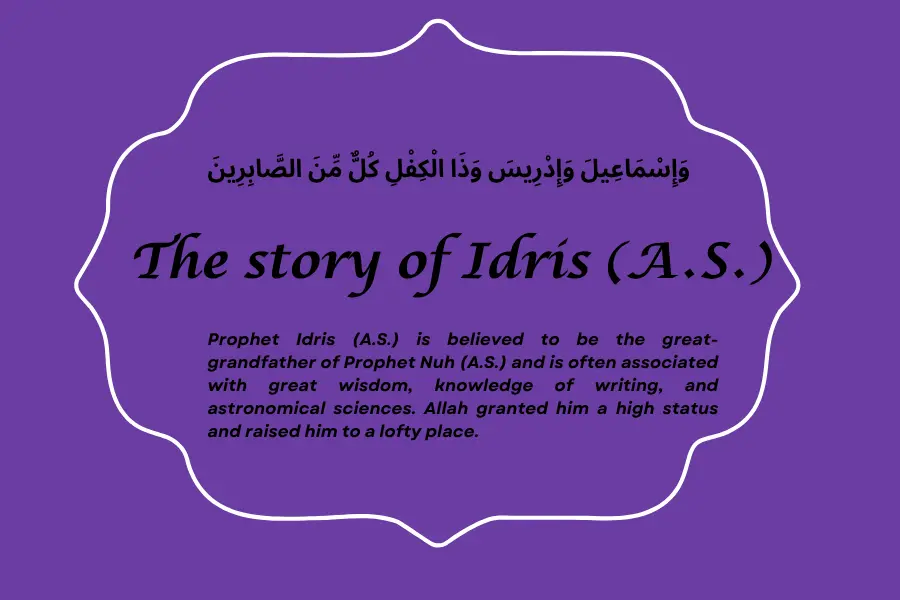The story of Idris (A.S.), known as Enoch in the Biblical tradition, holds a special place in Islamic history. Idris (A.S.) is considered one of the earliest prophets sent by Allah, born just a few generations after Prophet Adam (A.S.). His life was filled with wisdom, patience, and dedication to Allah’s commands. The Qur’an mentions Idris (A.S.) in multiple verses, honoring his status as a prophet and righteous man.
Idris (A.S.) was a figure of great significance not only because of his prophethood but also because of the many skills and advancements he introduced to mankind. He is reported to be the first man to write with a pen, to study astronomy and mathematics, and to introduce tailoring. These gifts from Allah made him both a spiritual and intellectual leader of his time.
While his story in the Qur’an is brief, scholars of Islam have preserved many details through Tafsir (Qur’anic exegesis) and Hadith traditions that shed light on his character and mission. His name, “Idris,” is linked to the Arabic word dars (study/lesson), symbolizing his association with knowledge, learning, and wisdom. Idris (A.S.) stands as a timeless example of how truth, patience, and knowledge lead to spiritual elevation.
This detailed blog will explore the life of Idris (A.S.), supported by Qur’anic ayats, authentic Hadiths, and Islamic references, highlighting not only his legacy but also the profound lessons Muslims can draw from his story.
Who Was Prophet Idris (A.S.)?
Prophet Idris (A.S.) is believed to be the great-grandfather of Prophet Nuh (A.S.) and is often associated with great wisdom, knowledge of writing, and astronomical sciences. Allah granted him a high status and raised him to a lofty place.
Idris (A.S.) lived in Babylon, where people had started to turn away from the worship of Allah. He was sent as a prophet to call people back to the oneness of Allah (Tawheed). Later, it is reported that he migrated to Egypt, where he continued his mission of guiding people to truth and righteousness.
Islamic traditions describe Idris (A.S.) as the first man to introduce writing with a pen, the study of the stars and planets (astronomy), and the use of tailoring as a profession. Because of his wisdom and advancement in knowledge, some scholars describe him as one of the most intellectual prophets of his time.
Qur’anic Mention:
Arabic: وَاذْكُرْ فِي الْكِتَابِ إِدْرِيسَ إِنَّهُ كَانَ صِدِّيقًا نَبِيًّا ﴿٥٦﴾ وَرَفَعْنَاهُ مَكَانًا عَلِيًّا ﴿٥٧﴾
Transliteration: Wa adhkur fil-kitābi Idrīsa innahu kāna ṣiddīqan nabiyyā. Wa rafa‘nāhu makānan ‘aliyyā.
Translation: “And mention in the Book, Idris. Indeed, he was a man of truth and a prophet. And We raised him to a high position.” (Surah Maryam 19:56-57)
Virtues of Prophet Idris (A.S.)
Prophet Idris (A.S.) was a man of truth, patience, and deep wisdom. Allah (سُبْحَانَهُ وَتَعَالَى) praised him in the Qur’an as “a man of truth and a prophet” (Surah Maryam 19:56). He was the first to write with a pen, skilled in various sciences, and known for his devotion to worship and steadfastness in calling people to Allah. His virtues of sincerity, knowledge, and perseverance continue to inspire believers across generations.
1. A Man of Truth and Patience
Idris (A.S.) was known for his truthfulness, patience, and steadfastness in conveying the message of Allah.
Arabic: وَإِسْمَاعِيلَ وَإِدْرِيسَ وَذَا الْكِفْلِ كُلٌّ مِّنَ الصَّابِرِينَ ﴿٨٥﴾
Transliteration: Wa Ismā‘īla wa Idrīsa wa dhal-kifl, kullum minas-ṣābirīn.
Translation: “And (We mention) Ishmael and Idris and Dhul-Kifl; all were of the patient.” (Surah Al-Anbiya 21:85)
2. His Elevated Status
Allah (سُبْحَانَهُ وَتَعَالَى) honored Prophet Idris (A.S.) with a high and noble status, elevating him spiritually through wisdom and righteousness, and physically by raising him to the heavens. This distinction reflects his closeness to Allah and his exceptional role among the prophets.
3. Knowledge and Skills
Prophet Idris (A.S.) was blessed with extraordinary knowledge and wisdom. Islamic traditions describe him as the first man to write with a pen, preserving knowledge for future generations. He was skilled in astronomy, mathematics, and tailoring, teaching people practical crafts while guiding them spiritually.
Hadiths About Idris (A.S.)
There are narrations that mention Idris (A.S.) being among the prophets the Prophet Muhammad (ﷺ) met during the Night Journey (Isra and Mi’raj). Hadith (Sahih Muslim): The Prophet Muhammad (ﷺ) said:
Arabic: فَلَمَّا جَاوَزْتُ قَالَ هَذَا إِدْرِيسُ، فَسَلَّمْتُ عَلَيْهِ فَرَحَّبَ وَرَدَّ السَّلَامَ
Transliteration: Falammā jāwaztu qāla: Hādhā Idrīsu, fasallamtu ‘alayhi faraḥḥaba waradda-salām.
Translation: “When I passed by, it was said: ‘This is Idris.’ I greeted him, and he welcomed me and returned the greeting.” (Sahih Muslim)
Idris (A.S.) in Biblical and Jewish Traditions
To strengthen interfaith understanding, it is important to also recognize how Idris (A.S.) is remembered in earlier scriptures. In the Bible, Idris (A.S.) is identified with Enoch, the great-grandfather of Noah (A.S.).
Enoch in the Bible:
Book of Genesis (5:21-24): Enoch is described as a righteous man who “walked faithfully with God” and was taken up by God without experiencing death.
Hebrews 11:5: “By faith Enoch was taken from this life, so that he did not experience death.”
This correlates with the Qur’anic mention of Idris (A.S.) being raised to a “high position.” Both traditions emphasize his closeness to God and his elevated spiritual status.
Jewish Tradition:
In Jewish mystical writings, such as the Book of Enoch, Idris (A.S.)/Enoch is described as a figure of immense wisdom, sometimes associated with angelic knowledge and heavenly secrets.
Comparative Insights:
- Similarities: Both Islamic and Biblical traditions highlight his righteousness, wisdom, and being raised to the heavens.
- Differences: Islam emphasizes Idris (A.S.)’s role as a prophet and teacher of mankind (writing, astronomy, tailoring), while Biblical accounts focus more on his spiritual journey and being taken by God.
This comparison helps readers understand that Idris (A.S.)/Enoch is a universally revered figure across Abrahamic faiths, symbolizing faith, knowledge, and closeness to the Divine.
Idris (A.S.) and the First Jihad in the Path of Allah
Another aspect of Idris’s (A.S.) legacy mentioned in Islamic traditions is that he was the first prophet to lead a struggle (jihad) against disbelievers in the name of Allah. As corruption, idolatry, and oppression spread among his people, Idris (A.S.) not only preached the message of Tawheed but also organized his followers to stand firmly against injustice and disbelief.
According to some scholars of Tafsir and history, Idris (A.S.) led the first armed resistance against those who openly rebelled against Allah’s commands. This was not done for conquest, power, or wealth, but purely in defense of truth, justice, and the worship of Allah alone. In this sense, Idris (A.S.) laid the foundation for what later prophets, including Muhammad (ﷺ), would teach about jihad as a struggle for the sake of Allah.
This illustrates two important lessons:
- Striving for Truth: Believers must be ready to defend their faith and protect the worship of Allah.
- Justice Over Oppression: Idris (A.S.) showed that fighting oppression and falsehood is part of upholding divine justice.
Idris (A.S.) and the Prediction of the Flood of Nuh (A.S.)
Islamic narrations and tafsir works indicate that Idris (A.S.), with the knowledge granted to him by Allah, foretold the coming of a great flood in the time of his descendant, Prophet Nuh (A.S.).
Through his study of the heavens and the signs of Allah, Idris (A.S.) warned his people about their sins and the consequences of turning away from Allah’s commands. Although the detailed story of him predicting the flood is not explicitly mentioned in the Qur’an, many Islamic scholars and historians, such as Ibn Kathir, have recorded that Idris (A.S.) foretold a divine punishment that would eventually come during the time of Prophet Nuh (A.S.).
This warning emphasized two lessons:
- Accountability: Disobedience to Allah leads to inevitable consequences.
- Mercy of Prophets: Prophets were always sent as warners to guide their people before punishment came.
Thus, Idris (A.S.) is remembered not only as a prophet of knowledge but also as one who foresaw the coming trial of the flood that would take place during Nuh’s (A.S.) era.
The Tablets of Enoch (Idris A.S.)
Another fascinating aspect attributed to Idris (A.S.) in Islamic and extra-Biblical traditions is his connection with tablets or scrolls of wisdom. Some Islamic scholars narrate that Idris (A.S.) was among the prophets who received divine scriptures, though the Qur’an does not explicitly detail the contents. These writings are often linked with knowledge of astronomy, time-keeping, and divine guidance.
In Jewish and Christian traditions, particularly the Book of Enoch (considered apocryphal), Enoch is described as having received heavenly tablets containing hidden knowledge, prophecies, and the secrets of creation. These tablets supposedly included wisdom about the stars, angels, and the order of the universe.
In Islam, while we do not confirm the Biblical apocrypha, many scholars highlight that Idris (A.S.) being the first to write with a pen could symbolize his role as a preserver of knowledge. It is possible that he recorded divine wisdom and guidance for his people on scrolls or tablets.
Below are some important lessons from the tablets:
- Preservation of Knowledge: Prophets served as the first preservers and transmitters of divine wisdom.
- Heavenly Guidance: Scriptures revealed to earlier prophets guided humanity to truth.
- Shared Traditions: The idea of Idris/Enoch receiving tablets shows a shared reverence across Abrahamic faiths for written divine knowledge.
Death, Elevation to the Heavens, and Being Lifted by Angels
One of the most unique aspects of Prophet Idris (A.S.)’s story is how Allah honored him with an extraordinary departure from this world. The Qur’an states:
Arabic: وَرَفَعْنَاهُ مَكَانًا عَلِيًّا ﴿٥٧﴾
Transliteration: Wa rafa‘nāhu makānan ‘aliyyā.
Translation: “And We raised him to a high position.” (Surah Maryam 19:57)
Islamic scholars explain that Idris (A.S.) did not experience death like ordinary men. Instead, he was lifted by the angels to the heavens. In some narrations, it is said that Idris (A.S.) befriended an angel who carried his deeds to Allah daily. Idris (A.S.) requested the angel to ask Allah to extend his life so he could continue worshipping Him. Eventually, by Allah’s will, the angel lifted Idris (A.S.) up into the heavens, where he was granted a lofty station.
During the Isra and Mi’raj (Night Journey) of Prophet Muhammad (ﷺ), the Prophet met Idris (A.S.) in the fourth heaven, confirming his elevated position.
Hadith Reference (Sahih Muslim):
Arabic: فَلَمَّا جَاوَزْتُ قَالَ هَذَا إِدْرِيسُ، فَسَلَّمْتُ عَلَيْهِ فَرَحَّبَ وَرَدَّ السَّلَامَ
Transliteration: Falammā jāwaztu qāla: Hādhā Idrīsu, fasallamtu ‘alayhi faraḥḥaba waradda-salām.
Translation: “When I passed by, it was said: ‘This is Idris.’ I greeted him, and he welcomed me and returned the greeting.” (Sahih Muslim)
This shows that Idris (A.S.) was not only raised in rank but also physically elevated to the heavens by Allah’s command, escorted by angels. Unlike ordinary human death, Idris (A.S.) was given an exceptional honor i.e. to live in the heavens until the time Allah decrees.
Lessons from His Elevation:
- Honor for the Righteous: Allah grants special honor to those steadfast in faith.
- Divine Mercy: Idris (A.S.)’s wish to worship longer was fulfilled in the most unique way.
- Immortality of Legacy: Though physically lifted, his example remains eternal on Earth.
Lessons from the Life of Idris (A.S.)
Below are some important and noteworthy lessons from the life of Idris (A.S.):
- Truthfulness (Sidq): Believers should embody honesty in all aspects of life.
- Patience (Sabr): Idris (A.S.) showed that patience is key to overcoming trials.
- Seeking Knowledge: He was among the first to introduce writing and learning.
- Hard Work: Being a tailor by profession, Idris (A.S.) demonstrated the dignity of labor.
- Spiritual Elevation: True faith elevates one’s rank before Allah.
Final Reflections on the Story of Idris (A.S.)
The story of Prophet Idris (A.S.) is a reminder of the values of truth, patience, knowledge, and hard work. His elevated rank signifies how sincerity and steadfastness in faith lead to honor with Allah. By reflecting upon the life of Idris (A.S.), Muslims can draw inspiration to remain patient, truthful, and committed to righteousness. Remember this Qur’anic reminder:
Arabic: وَرَفَعْنَاهُ مَكَانًا عَلِيًّا ﴿٥٧﴾
Transliteration: Wa rafa‘nāhu makānan ‘aliyyā.
Translation: “And We raised him to a high position.” (Surah Maryam 19:57)
The story of Idris (A.S.) (Enoch) continues to inspire Muslims across generations. By learning his story, we strengthen our faith and recognize the eternal rewards awaiting those who remain steadfast upon truth and patience.
Frequently Asked Questions (FAQs) about Prophet Idris (A.S.)
Who was Prophet Idris (A.S.) in Islam?
Prophet Idris (A.S.), known as Enoch in the Bible, was one of the earliest prophets sent after Adam (A.S.) and before Nuh (A.S.). He was a man of truth, patience, and wisdom, praised by Allah in the Qur’an (Surah Maryam 19:56–57).
What is Prophet Idris (A.S.) known for?
Islamic traditions state that Idris (A.S.) was the first to write with a pen. He was skilled in astronomy, mathematics, and tailoring, and guided people towards monotheism and righteousness.
Did Prophet Idris (A.S.) predict the flood of Nuh (A.S.)?
Yes, narrations from scholars like Ibn Kathir mention that Idris (A.S.) foretold the great flood that would occur in the time of Nuh (A.S.), warning people to repent and return to Allah.
Where is Prophet Idris (A.S.) mentioned in the Qur’an?
He is mentioned in Surah Maryam (19:56–57) and Surah Al-Anbiya (21:85–86), where Allah praises his truthfulness and elevated rank.
Is Prophet Idris (A.S.) still alive?
According to Islamic belief, Idris (A.S.) was raised to the heavens, as mentioned in the Qur’an: “And We raised him to a high station” (Surah Maryam 19:57). Some scholars interpret this as him being alive in the heavens, similar to Isa (A.S.).
Did Prophet Muhammad ﷺ meet Idris (A.S.)?
Yes, in the Hadith of Isra’ wal-Mi’raj (Night Journey), it is narrated that Prophet Muhammad ﷺ met Idris (A.S.) in the fourth heaven.
What lessons can we learn from Idris (A.S.)?
His life teaches us the virtues of patience, knowledge, truthfulness, devotion to Allah, and courage in standing against falsehood.
Is Idris (A.S.) the same as Enoch in the Bible?
Yes, most scholars agree that Prophet Idris (A.S.) in Islam is the same as Enoch mentioned in Biblical and Jewish traditions, though the Islamic perspective is purer and free from distortions.







4 Responses
i enjoyed reading
Hey very nice web site!! Rich .. Excellent .. Superb ..
I will bookmark уour website and share the blogs
What’s up, all the time i used to check web site posts here early in the break of day, since i like to gain knowledge of more and more.
It’s actually a cool and useful piece of information. I’m happy that you shared this useful information with us. Please keep us up to date like this. Thank you for sharing.